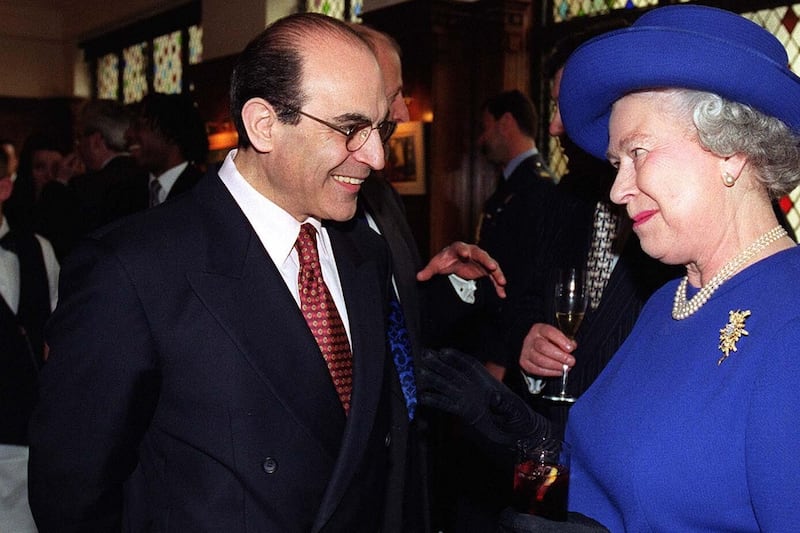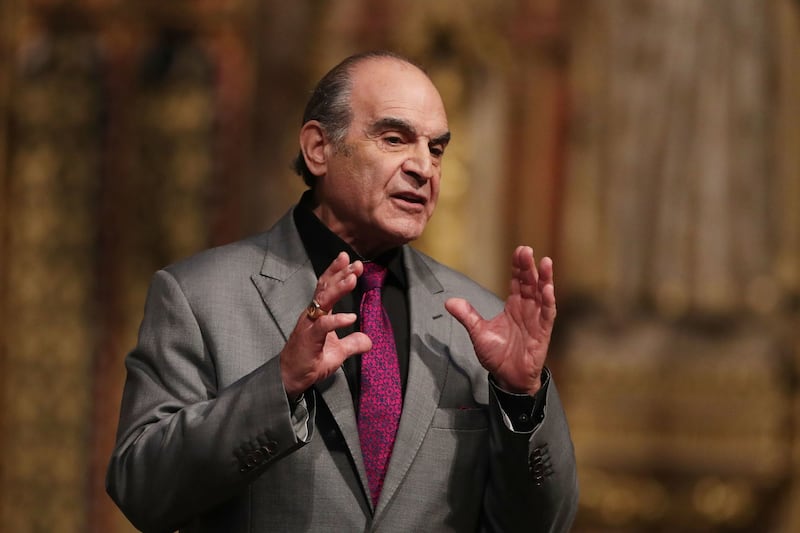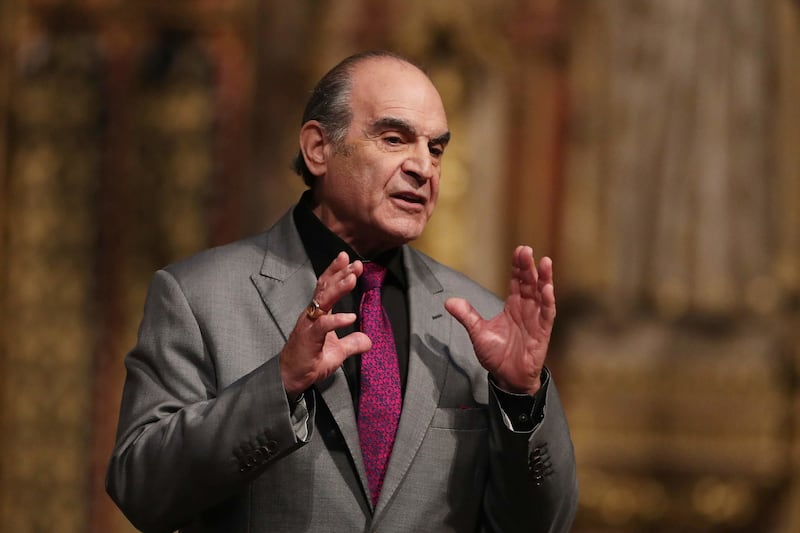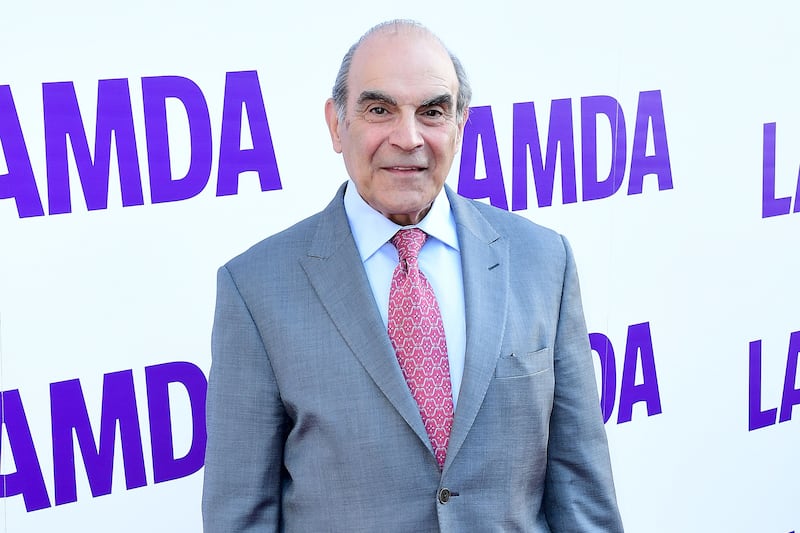HE WILL forever be recognised as Poirot, Agatha Christie's iconic Belgian detective whom he played for 25 years.
Yet this year David Suchet is celebrating a career that has spanned 50 years, from Shakespeare to Oscar Wilde, Edward Teller to Doctor Who, Decline And Fall and the recent TV series Press, co-starring Ben Chaplin.
For all his acting experience, the most embarrassing by far was a sex scene in the 1984 film adaptation of John Le Carre's The Little Drummer Girl when he was playing a character who had his throat cut from behind while making love to a woman.
"I remember talking to the director about this. 'I'm not happy doing sex scenes,' I said. 'I get embarrassed,'" he recalls in his memoir, Behind The Lens.
The director reassured him that the woman would be wearing a bathing costume and Suchet would be in swimming trunks or his underwear and only his back would be seen naked with the view only of his head being pulled back.
What viewers didn't see was the bashful actor waiting beforehand in his dressing gown, ready to go on set, when in walks a gorgeous Russian model in only a G-string. He went to the director to complain and said he couldn't get into bed with her, but was told he had no choice.
"So, for the only time in my life, I got into the bed, and rolled, as I was told to, on top of this girl, who looked at me, and we both sort of gently smiled at each other," he writes.
He continues: "There I was, on top of this girl, and when we heard the word 'Action!' well, let me put it this way: she was going for an Oscar."
Chuckling at the thought, he observes: "I thank goodness I'm not 6ft 3 and blond and really good looking. Fortunately I've had very few [sex scenes] and that one was a complete and utter extreme and a total surprise."
He relays this story in his beautifully packaged memoir, which not only charts his life in words but also in pictures, featuring images that Suchet – a keen photographer – has taken behind the scenes of the great and the good, intimate portraits and shots of the minutiae of his career and family life.
There are stylised photographs of actor and comedian Jack Whitehall and ex-Doctor Who Peter Capaldi, candid shots of Stephen Graham in Decline And Fall, along with Dames Julie Walters and Emma Thompson in full costume.
"I never thought I would have a book, it was just part of my hobby. I would always say to all of them – like Ben Chaplin and Peter Capaldi – do you mind if I do?"
Suchet (73) is one of the few actors who has worked constantly since studying at Lamda (the London Academy of Music & Dramatic Art) and joining the Royal Shakespeare Company in 1973, where he remained for 13 years. Soon after leaving, he clinched the role of Poirot, which he played until the detective's death, in 2013's final episode.
"Poirot shot me into the hemisphere of fame. Thank God for my family and for a wife who was an actor in her own right. And thank God for my upbringing and for my faith," he reflects on the shock of being thrown into the spotlight.
"I accepted the fame gladly because if you're not well-known as an actor you don't work – it's as simple as that. I hope I've never let it go to my head, I'm grateful for the roles it's afforded me and I hope it hasn't given me an inflated sense of myself in society."
Poirot struck a chord with so many viewers, he agrees.
"I received thousands of letters from my Poirot fans from all over the world – at the height of my career there were 730 million viewers – saying that whenever they were feeling stressed they'd watch a Poirot."
In the book he reveals: "After I finished filming the last episode, there was a sort of grieving process. I'm still grieving now. Because Poirot was my best friend; my alter ego, in many ways."
Today, he clarifies his feelings about the detective: "I'm not grieving over the end of Poirot. I grieve the man I got to know. I miss the character. But I don't miss not doing any more series."
He has made a point of not watching the other Poirots, either before or after his own creation – Albert Finney, Sir Peter Ustinov, Sir Kenneth Branagh, John Malkovich.
"People only want to have my opinion and hope that I will say something nasty. So I'm able to say, no opinion. I wish them every success, in the same way Peter Ustinov wished me success."
He says he's trying to be more selective in the roles he takes on in his 70s, so that he can spend more time with his family, and observes that without his wife, Sheila, there would have been no career.
"She's given me every opportunity – even during difficult times when I had to go to New York for six months, when I went to Mexico to film at Christmas, she's never ever said no to something I wanted to do.
"She's been the most generous, wonderful wife any actor could ever hope to have and she has allowed me my career while saying no to her own career, to look after the family."
Part of the proceeds of the book are going to the Tuberous Sclerosis Association, a charity close to his heart because of his grandson, Todd, who was diagnosed with Tuberous Sclerosis Complex, an incurable genetic disease, when he was just six weeks old.
"If you notice it early, it means it's really bad and the dear lad has it quite acutely. Because it's a rare condition, it's underfunded, people don't know about it so I'm trying to raise its awareness in any small way I can."
While offers of work keep coming, he has no thoughts of retirement. He'll be doing a 'personality' tour of Australia and New Zealand in January, called David Suchet: Poirot and More, a retrospective of his 50 years as an actor.
It's unlikely, though, that he'll be doing any more sex scenes.
:: Behind The Lens by David Suchet is published by Constable, priced £25.








